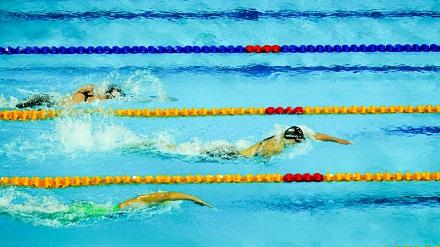

The professional sports league for elite swimming recently announced the schedule for its inaugural season, which will culminate in December at a custom-built pool at the Mandalay Bay Resort and Casino is Las Vegas, according to Swimming World magazine.
“Having signed more than 200 of the world’s best swimmers, ISL is shaking up the sport with a dynamic, fast-paced team-competition format,” the magazine reports. “The goal of ISL is to offer athletes more opportunities to swim competitively outside of the Olympic games, as well as financial support and year-round recognition.”
The league will feature such American swimmers as Katie Ledecky, Nathan Adrian, Natalie Coughlin and Ryan Murphy.
ISL competitions will be held at the IU Natatorium on the campus of the Indiana University-Purdue University Indianapolis campus in Indianapolis (Oct. 4-5), the Aquatic Swimming Complex in Napoli, Italy (Oct. 12-13) the LISD Westside Aquatic Center in Lewisville, Texas (Oct. 18-19), Duna Arena in Budapest, Hungary (Oct. 26-27, the Natatorium at the Eppley Recreation Center in College Park, Maryland (Nov. 15-16), the London Aquatic Centre in England (Nov. 23-24) and the Mandalay Bay in Las Vegas (Dec. 20-21).
The ISL features eight teams — four from the United States and four from Europe — with each team representing a major city and featuring 12 men and 12 women each, according to SportsProMedia.com. Team names include LA Current, London Roar and DC Trident. Swimmers from each team will compete for points in each race, which will be staged in sprint, relay and skin formats.
Any records set in ISL competition, however, will not be recognized,SportsProMedia.com reports: “After initially threatening bans for ISL participants, the sport’s global governing body, FINA, has said ‘swimmers are free to participate in competitions or events staged by independent organizers’, but that no results will be recognized.
Still, the league will provide world-class swimmers an opportunity to earn “substantial prize money, personal insurance and pension plans,” according to SportsProMedia.com. “Each of them will have signed two contracts — one with their team and another with the league — with central revenues, generated through sales of sponsorship, media rights and merchandise, distributed equitably.”
“It’s quite a unique set of commercial terms that swimmers have never experienced before, and I think apart from the competitive spirit that is clearly evident today amongst the teams, there is certainly a commercial prize to be had for all the swimmers competing in a way they’ve never achieved or had access to before,” Ali Khan, the ISL’s chief executive, said during a media call with international media.
“Konstantin [Grigorishin, ISL’s funder] was shocked by how underpaid the world’s top athletes were and saw the need to create a concept where the best athletes, who dedicate their lives to swimming, will be able to make a decent living out of their hard work and exceptional talents,” Dmytro Kachurovskyi, the league’s director of a development and a former president of the Ukrainian Swimming Federation, told The Baltimore Sun via email.
“Swimming is the most watched sport at the Olympic Games and we expect the ISL will generate nationwide engagement, which will lead to long-term sustainability not just for the league, but for the entire sport of swimming,” concluded Paris Jacobs, chief operating officer of the American Swimming Coaches Association and an ISL management consultant, speaking with Swimming World.

